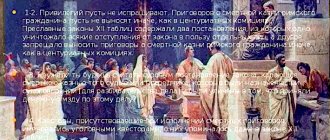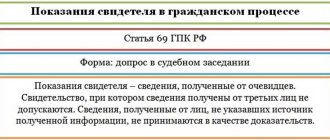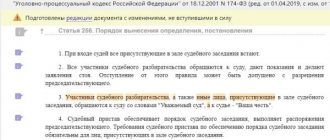From the general principles of adversarial proceedings, it follows that both the plaintiff and the defendant have equal rights in providing evidence. In civil cases, the evidence most often consists of written documents, but witnesses are often brought in to confirm a particular fact. The testimony of witnesses is especially important in the absence of other strong evidence or when it is insufficient (for example, in cases of collection of debts without a receipt, division of property and deprivation of parental rights, recognition as missing, etc.). What is the procedure for questioning a witness under civil law? Is it different from criminal cases? What are the features of interrogation of a witness by tax authorities? Read about this in our article.
Read about the interrogation of a witness by an investigator in a criminal case here.
Witness in civil law
In accordance with the rules of Art. 69 of the Civil Procedure Code of the Russian Federation, this is an individual (an organization cannot be recognized as a witness) who knows information important for making a decision. At the same time, this person is obliged to disclose the source of his knowledge (from whose words it became known, from what documents, personal participation in the events he is talking about), otherwise the court may not accept the testimony as evidence.
How often are witnesses heard at a court hearing? Based on the analysis of practice, quite often (especially in family disputes, labor disputes, compensation for harm). It should be noted that in the arbitration process, witness testimony is used much less frequently, where the main evidence is written documents.
In accordance with the rules of civil procedure, the following cannot be questioned as witnesses:
- Representatives, defenders, mediators in civil or administrative cases - about facts that became known to them in connection with representing the interests of their clients or participating in a dispute in another form (for example, when concluding a settlement agreement). Example No. 1 . Lawyer Egorov P.R. represented the interests of the plaintiff L.V. Polyakov. in court, preparing a claim for recognition of ownership of residential premises - a two-room apartment. The decision was made by the court in favor of the plaintiff, and after it came into force Polyakov L.V. appealed to the court to evict the defendant from the disputed apartment, having entered into an agreement for the provision of legal services with a large firm. At the court hearing, the defendant stated that he wanted to question lawyer P.R. Egorov. according to the circumstances of participation in the first trial. The court rightfully refused to satisfy such a request, citing the inadmissibility of questioning a representative of the party.
- A judge, including an arbitrator (as well as jurors in a criminal case, arbitration jurors) on issues related to making a decision or passing a sentence. Example No. 2 . At the court hearing to consider the claim for compensation for moral damages associated with the brutal murder of her husband, the plaintiff, wishing to confirm the proportionality of her claims, presented a number of evidence. Among them were documents confirming the loss of a breadwinner; facts confirming the moral suffering of children left without a father; the suffering of the parents of the deceased, for whom their only son was a support in life. In addition, the widow filed a motion to question the jurors who returned the guilty verdict against the killer in order to confirm her psychological state during the murder trial. Her request was denied. Previously, when the Civil Procedure Code of the Russian Federal Service for Financial Markets was in force (until July 1, 2003), some cases were considered with the participation of people's assessors. They also do not have the right to be called as witnesses if questions relate to their participation in those cases from the times of the RSFSR.
- Representatives of religious organizations and churches about the circumstances that became known to them as a result of confession.
Civil procedure legislation (Part 4 of Article 69 of the Code of Civil Procedure of the Russian Federation) allows persons summoned for questioning as a witness to refuse to testify:
- against yourself. So, if a citizen believes that he can harm himself and what he tells will entail negative consequences for him, then he has the right not to report anything;
- against the spouse and close relatives: children (including adopted children), parents (including adoptive parents), grandparents, grandchildren;
- deputies about the circumstances that became known to them as a result of their parliamentary activities;
- The Commissioner for Human Rights, as well as the Commissioners under the President of Russia - about information related to work.
As a general rule, a witness is a person disinterested in the outcome of the case. Simply put, he should absolutely not care whose side the court takes and what decision will be made. At the same time, despite the fact that formally the witness is not a party to the case, quite often the person interrogated is conditionally on someone’s side - the plaintiff or the defendant. Thus, a relative invited by the plaintiff most likely still wants the decision to be in favor of the plaintiff.
In practice, there are quite rare cases when courts, due to obvious interest, did not accept certain testimony of a witness as evidence. In accordance with the explanations of the Supreme Court of the Russian Federation, in such situations the grounds on which the conclusion about interest was made must be given in the decision.
Question: Are there age criteria for questioning a witness in civil proceedings?
Answer : The law does not provide clear criteria; an elderly person, a child, and even a person with mental disabilities can be questioned.
At the same time, the court is obliged to analyze the interrogation and information that was reported, and subsequently assess the reliability and admissibility of the evidence obtained, while observing certain conditions (the presence of a teacher when interrogating a child under 14 years of age; conducting an examination to understand the actual actions or involving specialist).
Signs for a witness at a wedding
According to the sign, the witness should not be dressed in white or black. It is best if the color of the dress is pink, blue or gold.
When the witness helps the bride during the morning preparations, you cannot look in the mirror with the bride. Otherwise, the witness may steal the groom.
Before going to the registration hall and already leaving the house, the witness must pin a safety pin to the bride's dress to protect against the evil eye. The sign says that on the wedding day, a whole stream of energy and wishes falls on the bride. The aura may not withstand such an onslaught, but the pin will protect.
A witness at a wedding cannot walk in front of the bride, only behind or to the side. Also, the bridesmaid should carefully ensure that the bride does not touch the empty ring box. According to the sign, this promises an empty and poor life for the newlyweds.
Another sign is unfamiliar, but it was followed before. When all the guests shout “Bitter” to the young people, the witness should shout “Sweet!” It used to be believed that the witness was closest to the bride, and her wishes would be the first to come true.
Request to question a witness
Such a petition (in other words, a request to the court) can be expressed either orally or in writing. In both cases, it is necessary to justify what circumstances that are important to the case can be told to the court by this or that person.
If the request is made orally, it will be entered into the minutes of the court hearing. Written petitions are attached to the case materials; it is not necessary to make copies for the other party (this is optional), an approximate example is here:
To the magistrate of court district No. 10 in Petrozavodsk, L.B. Mironova, plaintiff in a civil case for the recovery of 34,000 rubles for improper provision of services by defendant A.P. Maslov. (additionally, you can provide more detailed information: place of residence, telephone number, civil case number)
REQUEST to question a witness
There is a civil case pending in your proceedings based on the claim of L.B. Mironova. (that is, me) to A.P. Maslov. about the recovery of 34,000 rubles under a contract for the provision of services (repair of an apartment at my residence address: Petrozavodsk, Krasnoselskaya st., 14, apt. 5). The court hearing is scheduled for 02/20/2018, at 14:00.
I ask you to summon and interrogate G.R. Pavlova, who lives at the address: Petrozavodsk, st. Krasnoselskaya, 14, apt. 4 (it is necessary to provide the full details of the witness and his place of residence). Pavlova G.R. can explain the circumstances under which Maslov A.P. was hired by me to provide services for the renovation of two rooms in my apartment. Since Pavlova G.R. is my neighbor and close friend, I often trusted her to monitor the progress of the renovation, leaving the keys to the apartment (when filing a motion to summon the party is obliged to indicate what a potential witness can tell the court about. 2-3 sentences are enough to justify it, no need to retell everything testimony, but it is advisable to clearly “convey" to the court the essence of the information that you want to present through a witness. This will be useful if the court refuses to summon you: the appellate authority, having familiarized itself with the rationale, can take it into account and draw a conclusion in your favor).
Since Pavlova G.R. can talk about significant facts influencing the decision, while she is not a person interested in the outcome of the case, I ask you to interrogate her as a witness in the case of recovery of the amount under the contract for the provision of services from A.P. Maslov.
Based on the above, guided by art. 35 of the Code of Civil Procedure of the Russian Federation (the right of a party to file a petition) and Art. 69 Code of Civil Procedure of the Russian Federation (participation of a witness in civil proceedings),
ASK:
Summon G.R. Pavlova, residing at the address: Petrozavodsk, st. Krasnoselskaya, 14, apt. 4, for questioning as a witness.
Number, signature.
Question: When can such a petition be filed?
Answer : Almost at any time, even before the court accepts the claim for proceedings, but always before the judge retires to the deliberation room to make a final decision. The petition can be sent by registered mail (it must be registered, since this is the only way to prove sending in the event that the letter disappeared somewhere and did not reach the addressee). You can submit it to the office (for example, if you want to raise the issue of a summons before assigning the case). Make sure you have a second copy so that it can be stamped with acceptance.
And yet, most often the parties announce the calling and questioning of witnesses precisely at the court hearing. The court, having heard the petition, discusses it with other participants in the process, finding out whether they object or not. If the court comes to the conclusion that it is possible to interrogate the person requested by the author, he is summoned to the next court hearing. If attendance has already been ensured by this point (for example, when the parties are interested in a speedy consideration of the case), then the interrogation begins on the same day.
If a person is unable to attend a court hearing due to health reasons, the court has the right to organize a mobile court hearing to conduct an interrogation at the patient’s location.
All these rules are fully applicable to arbitration proceedings. Moreover, despite the dominant role of written evidence in the arbitration process, the judge is given the right to summon any person on his own initiative, without petitions from the parties. The civil procedure legislation does not directly grant the judge such a right, but does not prohibit it either. Moreover, from the meaning of Part 2 of Art. 96 of the Code of Civil Procedure of the Russian Federation (this norm provides for the distribution of procedural costs) it follows that the costs associated with calling a witness on the initiative of the court are covered from the federal budget. It turns out that the court still has the right to call witnesses without the request of the participants in the process.
It should be noted that in some situations it is not advisable to request a witness. So, in accordance with the rules of Art. Art. 161, 162 of the Civil Code of the Russian Federation, witness testimony cannot be accepted as evidence of a transaction if it was not drawn up in writing in cases where this was mandatory.
Example No. 3 . A cargo transportation company delivered furniture to a citizen, but the client refused to receive supporting documents (receipts) and formalize the contract, considering this to be unnecessary bureaucracy. Subsequently, while unpacking the cargo with a friend, the client discovered a broken mirror from an Italian manufacturer, the damage amounted to more than 100,000 rubles. The consignee filed a claim, but since he did not have documents and the transaction at his request was not formalized in writing, he decided to file a motion to interrogate his friend, who was present when the cargo was unpacked, as a witness. The court refused to satisfy the petition, since the parties cannot refer to the testimony of witnesses about the conclusion of the transaction if the mandatory written form is not complied with (in accordance with the requirements of Article 161 of the Civil Code of the Russian Federation, the preparation of written documentation is mandatory in civil legal relations between a legal entity and a citizen) . The court's refusal was recognized as legal in subsequent instances.
If your request was unreasonably denied, the court's ruling in this part cannot be appealed separately. At the same time, you have the right to express your disagreement with the refusal in an appeal against the court decision when it is made following the results of the judicial review. Practice shows that well-motivated requests in rare cases remain unsatisfied.
Summons for interrogation
If the request to summon the citizen whom you wish to interrogate is granted by the court, the consideration of the case is postponed to another date (except for the situation when his appearance has already been ensured in advance and the interrogation can begin immediately).
Question: How is a potential witness notified?
Answer : As a general rule, a subpoena, which indicates the time, place (which court, its address) and date of the court hearing.
This subpoena can be taken for personal delivery; this is permitted by law. If you do not want to undertake the obligation to serve a subpoena, the court cannot “force” you to notify the citizen; the delivery of a notification to him by a party is possible only with the voluntary consent of this party.
The court has the right to send a summons by regular or registered mail (by the way, in the petition you can focus on this and ask to send a registered letter). In some cases, witnesses may be called by telephone or telegram, as well as by fax. Prompt notification of a person about his appearance is SMS information, which has recently been increasingly used by the judiciary. It should be noted that in order to use this method of notification, the judge must have the written consent of the citizen to send messages to him.
Example No. 4 . Witness I.P. Ryabov was summoned to the court hearing on property inheritance, who in good faith appeared in court on a subpoena, testified and signed consent to notification by sending him SMS messages. Subsequently, the court came to the conclusion that it was necessary to re-interrogate I.P. Ryabov. Since there was agreement from him, the date of appearance of the next meeting of Ryabov I.P. notified by SMS message to the phone number.
In the event that it is necessary to summon a minor, his parents are notified of the date of the hearing, in whose presence the interrogation will subsequently take place.
When a subpoena is sent to a witness, procedural documents (a copy of the statement of claim, objections, etc.) are not sent, unlike the parties to the case, to whom all this should be sent.
More than one bridesmaid or bridal team
The bridesmaid cortege is a Western custom that has been gaining popularity in Russia for several seasons. If you are a traditionalist, you will definitely choose only one girl to support you. However, if you don't adhere to wedding standards and you have a lot of sisters or friends and you can't choose just one of them, you might want to consider choosing a larger group. You'll feel better! Women of similar appearance gathered around the bride are a pleasant accent that will add positive energy and freshness to the wedding and reception.
No-show
If the summoned citizen fails to appear, the court will determine the reasons for the failure to appear. Usually the following are considered valid reasons:
- illness (of himself or his loved ones);
- death of relatives;
- pre-planned travel outside the city;
- work in another region (for example, on a rotational basis) and other circumstances that objectively indicate the impossibility of attending court.
If the valid reasons for repeated failure to appear are not established, the court may apply a summons, instructing bailiffs to deliver the person on the appointed day. In addition, the following sanctions may be applied to those who evade the call:
- a fine of up to 1000 rubles (in accordance with Part 2 of Article 168 of the Code of Civil Procedure of the Russian Federation);
- fine up to 2,500 rubles for citizens; a fine of up to 5,000 rubles for officials (in accordance with Articles 119, 157 of the Arbitration Procedure Code of the Russian Federation).
- fine up to 5,000 rubles for citizens; a fine of up to 10,000 rubles – for a municipal (state) employee; a fine of up to 30,000 rubles – for officials (in administrative cases, in accordance with the rules of Article 122 of the CAS RF).
Before using compulsory instruments, the court repeatedly ascertains from the participants the opinion of the need to interrogate the person who has not appeared. And only if it is objectively impossible to consider the case in his absence, the court calls the witness again. Of course, imposing fines and imprisonment are extreme measures used by the court in exceptional cases. By comparison, in criminal cases, orders for arrest are made by judges in almost every third case considered in the general procedure. In civil proceedings, cases of prosecution in one court can be counted in a few cases over a period of several years.
Witnesses at a wedding - signs for the happiness of the newlyweds
Since ancient times, wedding assistants have been considered the guardians of the young. According to the sign, evil spirits will be nearby on the day of the celebration. And the task of the witnesses is to confuse and deceive her. Outwardly, the main assistants also look like a couple in love: they are festively dressed, cheerful and maybe even in love. The dark force will become entangled and will not be able to harm the newlyweds.
Not everyone believes in evil spirits today, but there is some truth in superstitions. A huge number of people gather at the wedding. Each of them directs their own flow of energy, even if it is positive. This is a big blow to the energy of the young couple, which is not easy to withstand.
Witnesses perform certain rituals and actions for the future happiness of the newlyweds. For example, the witness always keeps a white thread ready. It will be needed if the bride accidentally drops her engagement ring.
A friend places an open lock at the threshold of the newlyweds' house, and after the now husband carries his beloved into the house in his arms, he closes the lock with a key and throws it away. Thus, the happiness of lovers is under reliable protection.
In addition to the pin, the witness can hem the hem of the bride's dress with red thread for good luck. One inconspicuous stitch is enough.
Witness rights
Despite the fact that the witness is not a full participant in the trial, as, for example, the plaintiff and defendant are, he has certain rights:
1. Give evidence in your native language with the help of an interpreter provided by the court. It is enough for a witness to state that he does not fully or partially understand the language in which the proceedings are being conducted, after which the court will take a break to call an interpreter from his native language; the costs of paying for his work will be paid from the federal budget.
2. We have already written that in exceptional cases, a witness has the right to be questioned at his place of residence or in a place of temporary stay (in a hospital, in a nursing home, at work, etc.). The conclusion about the need to travel to the person’s location is made by the court, taking into account all the circumstances; there is no single rule in the law with a list of cases of traveling.
Example No. 5 . At the court hearing, the plaintiff, whose demands were to recognize the actual acceptance of the inheritance in the form of the disputed apartment, filed a petition to interrogate a close friend of the deceased grandfather. He had to confirm that the plaintiff actually incurred the costs of repairs and maintenance of the disputed apartment. After the petition was satisfied and the summons was sent, it turned out that the elderly man was paralyzed, but was conscious and did not suffer from mental disorders. The court decided to organize an on-site hearing at the witness’s place of residence, and the interrogation took place there.
If, when drawing up a petition to summon a person, you already know that he cannot come to court for health reasons, you can immediately indicate this in the text, asking the court to go to the address. A citizen who has been recognized as a witness can also ask the court for questioning at his place of residence - it is enough to inform the court about this in any form and provide confirmation of his state of health.
3. Reimburse the expenses that the citizen incurred due to the fact that he had to appear in court for questioning. First of all, this concerns transportation costs - even if you spent 100 rubles to get to the courthouse by bus, this small amount can be reimbursed by applying to the court with an application (you can submit it through the office or directly at the court hearing after interrogation). You must attach relevant documents (tickets, receipts, etc.) to your application to confirm your actual expenses.
4. Receive monetary compensation for absence from work. A request for payment of a sum of money should also be made in an application addressed to the judge, with a calculation attached (it is advisable that the calculation be made by the accountant of the enterprise where the witness works).
Here is an example of such a statement:
Magistrate of court district No. 10 of Petrozavodsk G.R. Pavlova, witness in the civil case in the suit of L.B. Mironova. to the defendant Maslov A.P. on the recovery of 34,000 rubles for improper provision of services (additionally, you can provide more detailed information: place of residence, telephone number, civil case number)
REQUEST FOR MONETARY COMPENSATION
There is a civil case pending in your proceedings based on the claim of L.B. Mironova. to Maslov A.P. for the recovery of 34,000 rubles under a service agreement. I was summoned as a witness to a court hearing on February 20, 2018, at 2:00 p.m. I showed up when called, and therefore was absent from the workplace from 13:00 to 17:00, that is, 4 hours of working time.
When calculating my salary for February 2021, I was deducted 4 hours of unworked working time, and therefore I received a salary of 1000 rubles less.
Based on the above, guided by Part 3 of Art. 70 of the Code of Civil Procedure of the Russian Federation (the right of a witness to apply for reimbursement of expenses and receive monetary compensation) and Part 1 of Art. 95 of the Code of Civil Procedure of the Russian Federation (rules for calculating compensation, focused on the amount of average earnings),
ASK:
Compensate me 1000 rubles in connection with the loss of working time caused by appearing for questioning as a witness.
Attachment: a copy of the order for the appointment of a HR specialist at Raduga LLC, an accounting statement of wages for February 2021, a copy of the summons to appear at the court hearing on 02/20/2018, a copy of a bank statement indicating the account details for transferring the amount.
Number, signature.
If the witness is not employed, he may be paid compensation for distraction from personal affairs in connection with a summons for questioning. Cases of filing applications for compensation by unemployed citizens are extremely rare - the approximate compensation is about 200 rubles.
5. Use documents and written records during interrogation. The implementation of such a right is especially important in arbitration proceedings, but also in general civil proceedings, access to documents is sometimes caused by objective necessity (for example, when information containing complex digital calculations is reported).
The presiding officer must be informed that written documents (brought with you or already in the case) will be used when giving testimony. The parties have the right to familiarize themselves with the documentation used and petition the court to include it in the materials. The court may not allow the use of records if they contain data that is not relevant to the case.
How is a bridesmaid different from a witness? Summary
There may be many bridesmaids, but there is only one witness. Bridesmaids form an entourage to accompany the bride, but the wedding can proceed without them. The best man, known as the first or senior bridesmaid, is the person without whom the wedding ceremony and reception cannot take place. Literally and figuratively.
Are you a bride-to-be who will be completing your bridal team? Use the services of a wedding planner who, in addition to being an irreplaceable witness, will help you go through all the stages of organizing a wedding and banquet without any problems!
Responsibilities of a witness
The responsibilities of a witness include not only appearing at a court hearing when summoned, but also giving only truthful testimony. In addition, he does not have the right to refuse to testify, unless the information concerns relatives and friends (we wrote about lawful refusal earlier).
In Russian civil law there is no such thing as a witness oath - Russians are not forced to say “I swear to tell only the truth and nothing but the truth.” We know from foreign films that in a number of Western countries it is customary to force a witness to take an oath; in some states this must be done with his hand on the Bible.
For refusal to testify and for knowingly false testimony, a witness may be held liable under Articles 307 and 308 of the Criminal Code of the Russian Federation. The judge warns every citizen about such responsibility before he begins to report information known to him to the court.
Initiative to initiate a criminal case under Art. Art. 307, 308 of the Criminal Code of the Russian Federation can belong both to the court (the judge reports this to the police) and to the parties (an application is sent to law enforcement agencies). Refusal to testify may result in a fine of up to 40,000 rubles, as well as mandatory correctional labor. For giving false testimony the following may be imposed:
- a fine of up to 80,000 rubles, compulsory work for a period of up to 480 hours, corrective labor for a period of not more than 1 year;
- imprisonment for up to 5 years - in cases where false data is associated with the illegal accusation of other people of committing serious or especially serious crimes.
For those who deliberately provided the court with false information, but admitted it before the court retired to the deliberation room, the law provided the opportunity to avoid criminal prosecution and subsequent punishment.
Of course, in order to bring to criminal liability under Art. Art. 307, 308 of the Code of the Russian Federation there must be objective grounds indicating the intent of the person. Even if the falsity of testimony is reliably established, it is not always possible to talk about the elements of a crime - after all, there may be an honest mistake.
Example No. 6 . In the case of deprivation of parental rights, the child’s teacher gave testimony, who positively characterized the mother - she was always present at parent-teacher meetings, actively worked in the parent committee, and treated her son well. The child's father wrote a statement to the police saying that the teacher was deliberately lying. It turned out that the witness made a conclusion about the mother’s well-being only based on several meetings with her, but she did not know that at home the parent drinks alcohol every day and often beats her child. Since the intent to provide false information to the court was not established, in initiating a criminal case under Art. 307 of the Criminal Code of the Russian Federation was denied.
Establishing intent is also extremely important when refusing to testify. It is necessary to understand the reasons why a citizen refuses to testify. In practice, there were cases when such a refusal was associated with a secret family relationship that no one knew about. Thus, an elderly man refused to testify against a young woman without explanation. Only after the initiation of a criminal case under Art. 308 of the Criminal Code of the Russian Federation, he admitted that that woman was his illegitimate daughter, which no one from his official family knew about. The case had to be dropped due to lack of evidence of a crime.
How to choose a witness for a wedding
To make the right choice in the direction of an interested girl, you need to carefully study the qualities of a potential bridesmaid. Ideal set: punctual, responsible and patient girl. The upcoming holiday should be no less important for her than for the bride herself.
Most often the choice falls on a close friend. But a trusting relationship between two women is not always the decisive factor for choosing a witness for a wedding.
A wedding is a holiday for a couple in love. Everything must be perfect. Concerns and organizational issues fall on the shoulders of the assistants. It is necessary to monitor the mood and beauty of the bride, correct shortcomings, and provide psychological support, because the bride is always nervous.
Therefore, if your close circle does not meet the selection criteria, you can and should turn to good friends. The solution can be explained correctly.
In addition to organizing the holiday and worries associated with the responsible approach of a potential witness, the bride is concerned about the issue of signs associated with the wedding.
Can the witness be married?
The modern choice is driven by practical considerations. Previously, it was believed that the assistant should be a young and unmarried girl. There is a sign that promises an unhappy marriage if the accompanying person is married. Today you don’t have to pay much attention to this sign. Cases where the assistant is married and far from young are common. The main thing is that she is a responsible and sensitive woman who wants the celebration to take place at the highest level no less than the bride wants it.
Can my sister be a witness?
When among your friends there is no worthy candidate for an important post, the choice may fall on your own sister. And in this case, the signs do not advise taking her as an accompanying person. This is a bad sign. They used to believe that the sister might be jealous of the bride’s happiness and take it away. Envy may be white, but it will work in the opposite direction. Therefore, it is better to leave the sisters as guests of honor at the wedding, and look for an important assistant among friends and acquaintances.
How many times can you be a witness?
There is no limit to the number of times a woman will take on such a responsible role. On the contrary, if a girl has more than once become a key figure in a bright day, it means that she knows how to organize the process and will probably not let you down.
Procedure for questioning a witness in civil cases
The procedure for interrogation is generally similar to criminal proceedings: the Code of Civil Procedure of the Russian Federation instructs the court to establish the identity of the witness - in other words, the participants in the process must make sure that in front of them is the one who was planned to be interrogated. Typically, identity is established using a passport (foreign passport), checking the data in the document. If you don’t have a passport, a license, military ID or service ID will do (the main thing is to have a photograph that can be compared with your appearance).
The court finds out:
- FULL NAME;
- place of residence and work;
- Date and place of birth;
- the presence of circumstances that prohibit interrogation (interest, special official status, etc.);
- family and close relationships with the participants in the process (they become known from the words of the interrogated).
If it turns out that a citizen is a relative of someone present, he is explained the constitutional right not to testify against other participants in the proceedings if they have close family ties with him.
The court explains the rights and obligations that we told the reader about earlier (after an oral explanation, the interrogated person is required to sign a signature, which is attached to the materials of the civil case).
The information that the citizen provided about himself and the circumstances is recorded in the minutes of the court session. The interrogated person, like the direct participants in the court session, is obliged to comply with the rules of the court proceedings: address the court “your honor” or “dear court.”
Before the start of the interrogation, the witness is removed from the courtroom; he should not be present at the court hearing when resolving procedural issues and interrogating other persons. After he has given evidence, with the permission of the presiding officer, he has the right to be in the room.
The form in which the interrogation is carried out (a story or answers to questions) is not regulated by law. Usually the procedure begins with a free story about known circumstances relevant to the case, after which answers to clarifying questions are given. The first to ask questions is the party on whose initiative the citizen was invited; the court has the right to ask questions at any time.
The presiding officer has the right to interrupt the interrogated person - for example, when he explains facts that are not relevant to the case. People who have never been to court before may unknowingly begin to talk about events that have nothing to do with the dispute - it seems to them that all the details are important. It happens that a witness is interrupted due to excessive emotionality, and sometimes due to incorrect or offensive words addressed to the participants in the process. Such behavior is considered contempt of court and may result in a fine.
The presiding officer has the right to withdraw a question (that is, not to give the participant the opportunity to ask it) if he:
- not relevant to the dispute;
- relevant to the case, but beyond the scope of the subject matter of the claim;
- formulated incorrectly, unethically, asked in a raised tone, with pressure on the witness;
- already contains the answer or directs the answer to the required party (for example, you cannot ask the question: “Did you live with the defendant because you had common children with him and he bore the family expenses, and after he was fired from his job, you decided to divorce him?” — this question already contains an answer option, which is unacceptable).
If necessary, the witness may be questioned again. For example, if the subject of the claim changes or additional demands of the plaintiff, counterclaims or other new circumstances in the case appear, as well as if there are significant contradictions between the explanations of this person and other interrogated ones.
Question: Is it possible not to appear when summoned, but to send written testimony to the court, drawn up in free form and certified by a signature (for example, when a person lives in another region)?
The answer to this question follows from the general provisions of civil law, which focuses on obtaining evidence directly from the source. Therefore, the presentation of written testimony instead of a person’s appearance in civil and arbitration proceedings is unacceptable (unlike criminal proceedings, where, subject to certain conditions, eyewitness testimony given during the investigation may be read out).
In exceptional cases, the court may send an order to the court of the region where the witness is located. During the execution of the order, the overall duration of the trial is suspended. Due to the significant increase in the period for consideration of the case and the low effectiveness (after all, it is difficult for a judge who does not know the essence of the case to take into account all the nuances and fully conduct an interrogation), this method is used extremely rarely at present.
In addition, the courts are increasingly using a video conferencing system - a technical possibility for interrogating a person located in another region, country, or even in prison. This modern method of interrogation was introduced into the Code of Civil Procedure of the Russian Federation in April 2013 and is actively used in practice.
Witness at a wedding - signs to choose
Grooms are less excited about the wedding, but this does not mean that you can be careless in choosing a witness. The groom's witness is an equally important assistant.
The groom needs to remember that the witness must have a sparkling sense of humor and excellent speaking skills. After all, the bride price and other rituals will fall on the shoulders of the witness. In addition, the groom will also need help in organizing the celebration, and who else but the witness at the wedding will be the best adviser.
Is it possible for married people to be witnesses?
According to the sign, witnesses at a wedding should be unmarried and unfamiliar people. They can be in love with each other, but they should not be married. The sign came from ancient times and it was from there that the belief arose that witnesses at a wedding often become the next candidates for the newlyweds.










